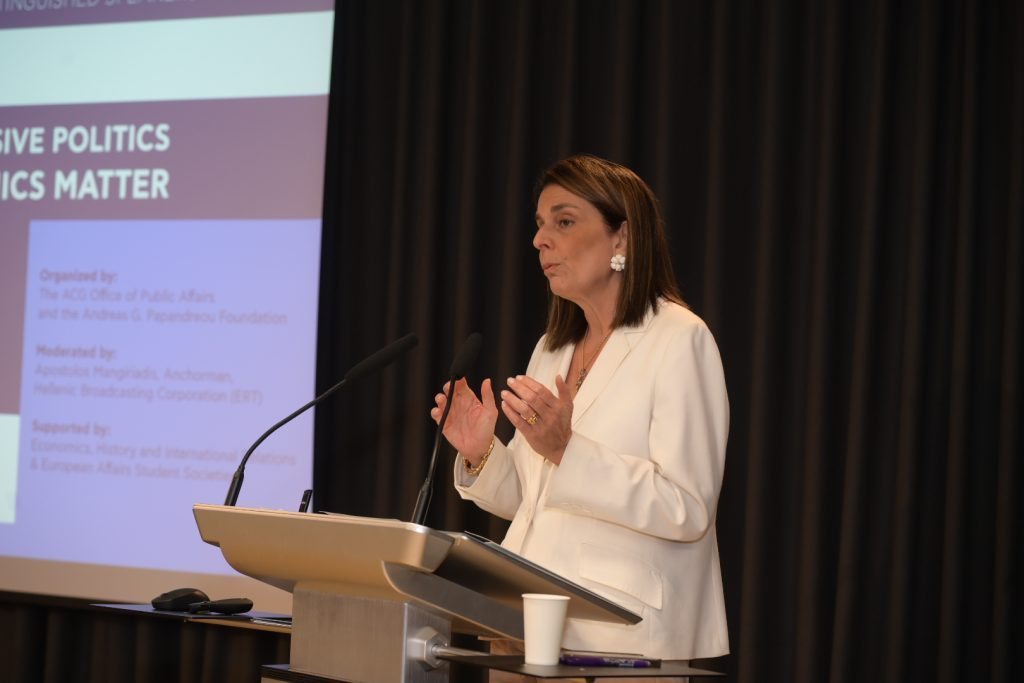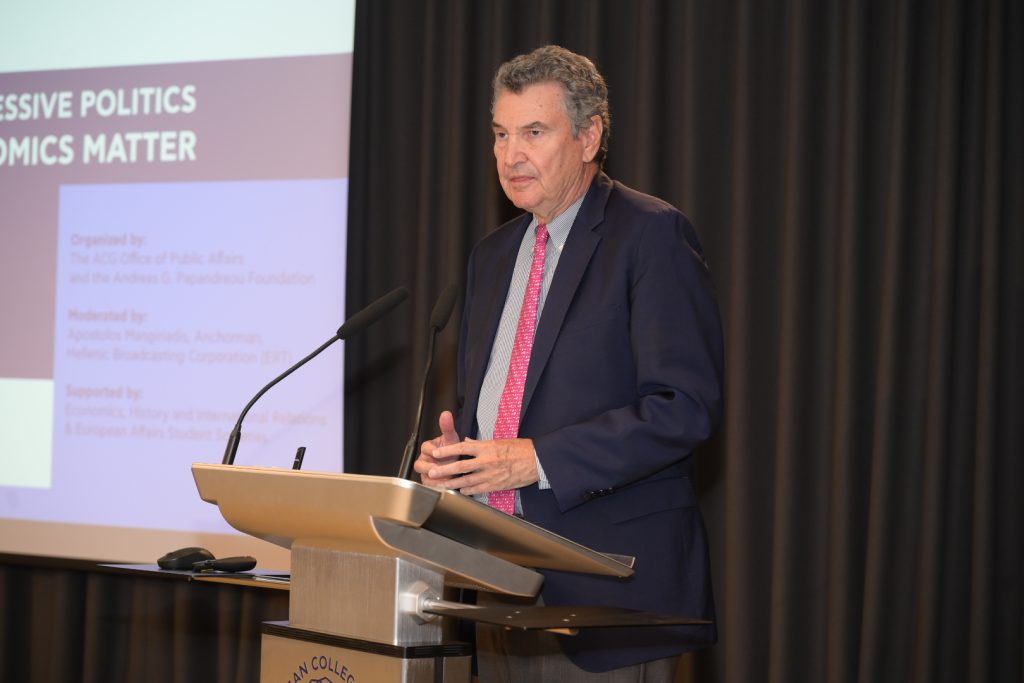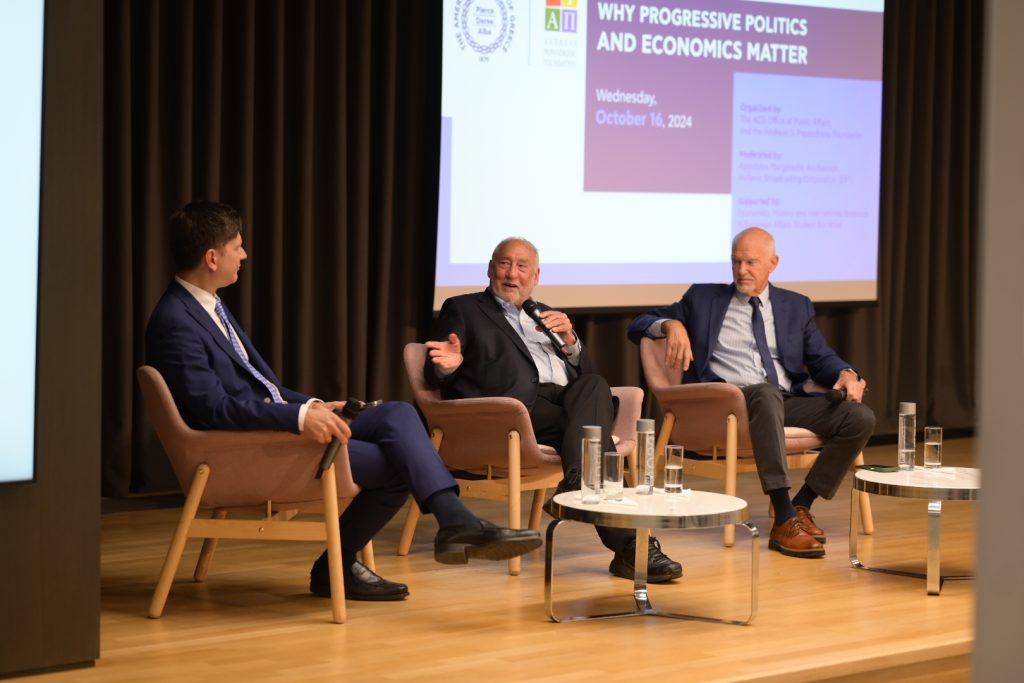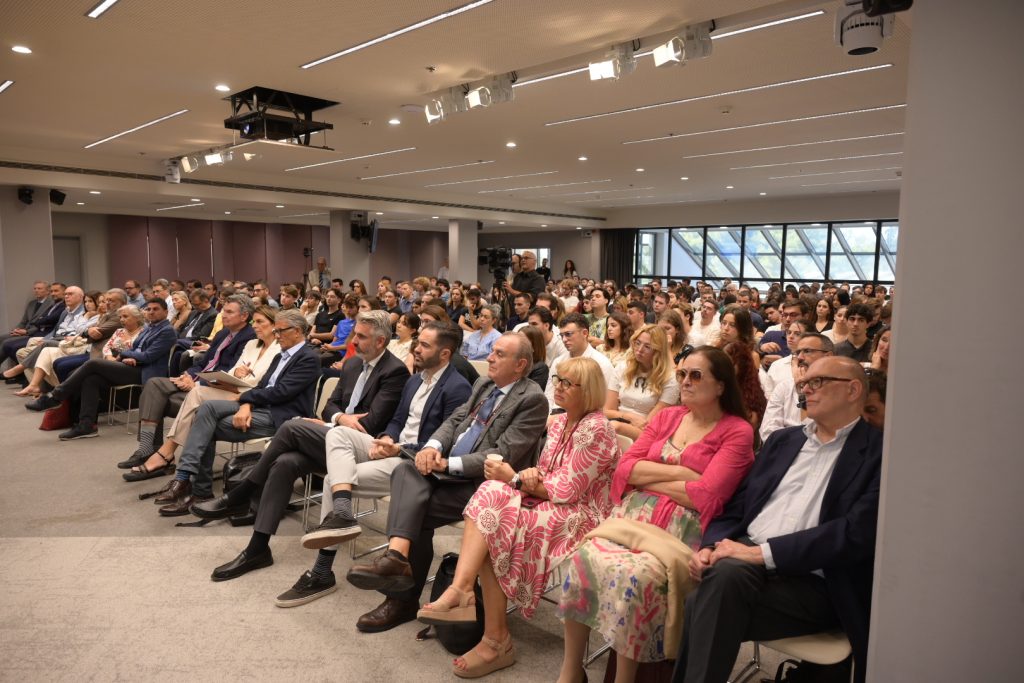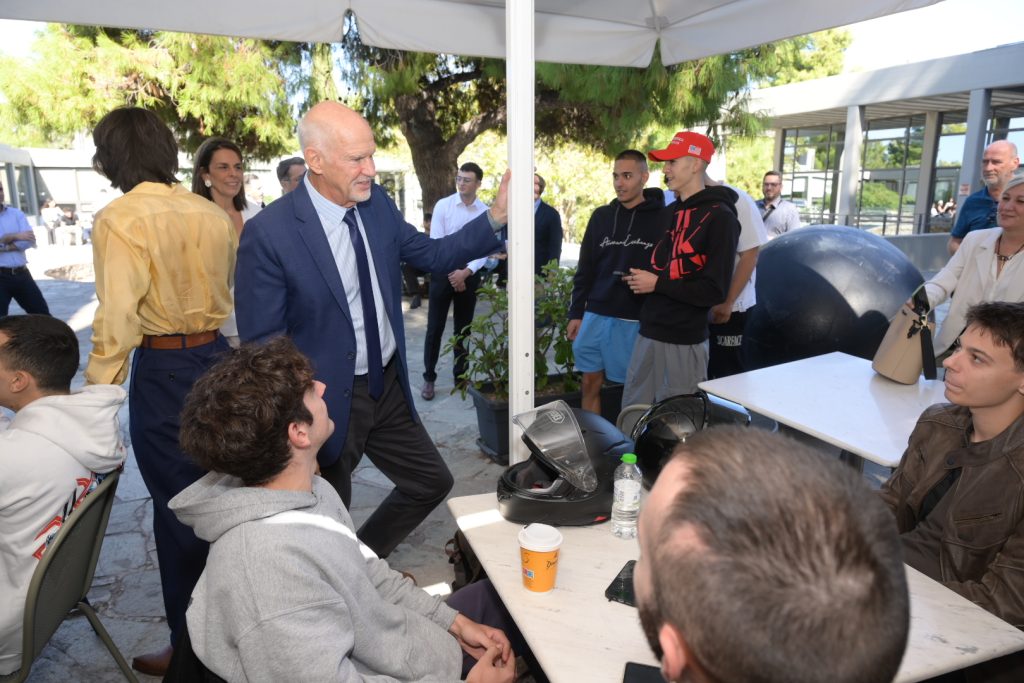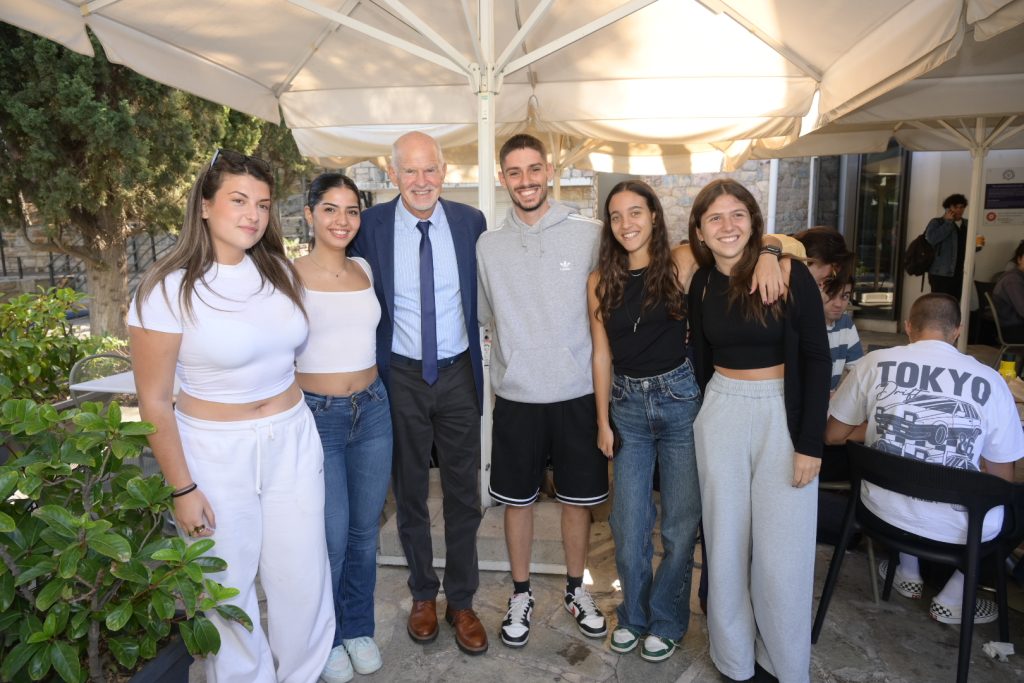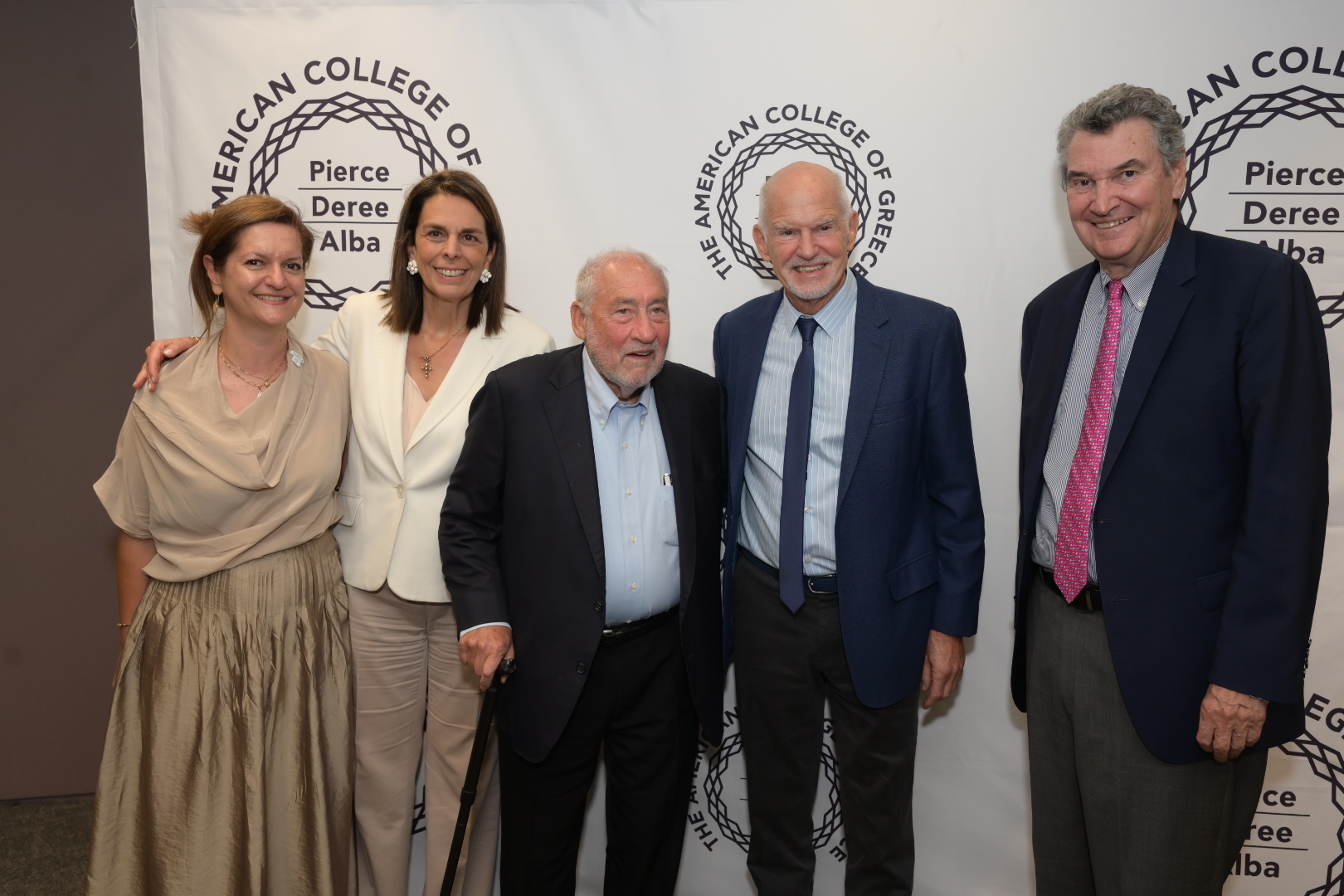
On Wednesday, October 16, ACG was honored to host Columbia University professor and Nobel Prize-winning economist Joseph Stiglitz and former Greek Prime Minister Georgios Papandreou, two influential figures whose insights and expertise illuminate the intersection of economics and politics, as our featured speakers at the 2024 Distinguished Speakers Series. The ACG Events Hall served as a backdrop for this event, bringing together students, faculty, staff, alumni and community leaders. Organized by the ACG Office of Public Affairs in partnership with the Andreas G. Papandreou Foundation, this event was supported by the Deree student Economics, History, International Relations, and European Affairs societies.
Claudia Carydis, Vice President of Public Affairs at ACG, opened the event with a welcoming address, highlighting the college’s commitment to providing a transformative learning experience and fostering a culture of ethos, critical thinking, and active leadership. Carydis emphasized ACG’s dedication to equipping students with vital soft skills and an ethical framework essential for success in today’s world.
ACG President Dr. David G. Horner took the stage and highlighted the impact of both speakers’ work, reminding us of the power of thought leadership in creating a better future for all. He noted their groundbreaking contributions that have reshaped the landscape of economics and politics.
The engaging and lively discussion was moderated by Apostolos Mangiriadis, anchorman of the Hellenic Broadcasting Corporation (ERT), and touched upon a wide range of issues, from the U.S. elections and foreign policy to technology’s impact on society. Stiglitz opened the discussion by addressing the significant implications of the upcoming U.S. elections, which he described as pivotal for democracy. He emphasized that these elections represent a critical moment for democratic continuity, warning that Donald Trump’s actions pose a serious threat to democratic institutions. He stated, “We are at a critical juncture; these elections are about the continuity of democracy itself,” highlighting how Trump’s views on trade and tariffs could also destabilize commerce and finance, leading to inflation.
The conversation then shifted to the interplay between economics and democracy. Stiglitz argued that “without economic stability, democracy cannot thrive,” pointing out that economic inequality results in political inequality. He noted the monopolistic tendencies of big tech companies, which threaten economic fairness and undermine democratic principles, asserting that these monopolies “not only threaten economic fairness but also undermine the principle of one person, one vote.” Papandreou echoed this sentiment, emphasizing, “Democracy is under siege when a few hold vast economic power.”
Reflecting on his experience as Prime Minister, Papandreou shared insights about his efforts to promote affirmative action in education, explaining, “During my time in office, we ensured that marginalized groups had access to higher education through specific quotas.” He highlighted the benefits of participative governance, saying, “When the people are involved in decision-making, they feel a sense of ownership over their society.”
Mangiriadis shifted the discussion to the critical role of technology in exacerbating social inequalities, with Stiglitz warning that unchecked monopolies in big tech could deepen economic disparities and threaten societal cohesion, stating, “The very fabric of our society is at stake if we allow these companies to operate without accountability.” Papandreou added that rising inequality and concentrated power contribute to young people’s growing disconnection from politics, emphasizing the need for reforms to engage them. Both called for stronger regulations, with Stiglitz advocating for laws to hold platforms accountable for the spread of misinformation, which erodes trust in democratic institutions, and Papandreou stressing the importance of ensuring technology serves the public good, not just corporate interests.
Both speakers underscored the urgent need for a global perspective on these challenges, with Stiglitz noting, “The world is becoming increasingly multipolar. We must adapt our policies to reflect this new reality.” Papandreou emphasized, “The European Union must stand up for its own interests and values, advocating for democracy and human rights globally.”
Then, it was the turn of Deree students to ask questions, and the packed audience eagerly sought insights on politics and economics in addressing global challenges. Papandreou stressed the need for government intervention to ensure that profits align with societal responsibility, arguing against isolationist solutions to issues like migration and climate change. Stiglitz echoed this, expressing the need for affirmative action to promote equity. Both speakers emphasized the importance of flexibility in the labor force for societal well-being and discussed the necessity of media accountability and the limits of free speech.
The event wrapped up with Dr. Michalis Psalidopoulos, Chief Consultant and Chair of the Advisory Board of the ACG 150 Institute for Hellenic Growth and Prosperity, presenting Stiglitz and Papandreou with the inaugural 3D-printed coins from ACG’s Experimental Economics, Fintech, and Analytics Research Laboratory (EEFA), celebrating both speakers’ influential roles in advancing the dialogue surrounding economics and democracy.

